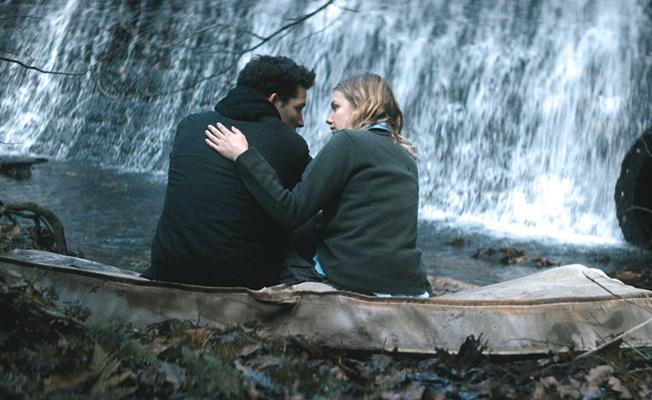Bridgend closes with a text that informs us of the suicide epidemic that is still sweeping the youth of this Welsh county, which at its peak saw 79 people (mostly teenagers) take their own lives.
So, what’s behind this? Bridgend seems to posit several explanations, while committing to none. There’s a vague assumption that this was a desperately extreme bid by disaffected youth to exercise some control over their lives, reclaiming power from the adults – but the ‘why’ goes unanswered.
Plot points on a graph
We enter these events via Sara (Murray – Game of Thrones) as she returns to the troubled village she grew up in. Her father is to lead a police investigation (which goes nowhere) into the cause of the epidemic.
Almost instantly she falls in with a dangerous local gang, and it’s here the problems set in.
It’s hard to buy Sara’s instant enchantment with this bunch of cider-swigging vandals – almost everyone is distinctly charmless.
And yet, her involvement with them is key to the narrative.
Sara and her father (Waddington) share a close relationship. In the beginning her request for him to carry her over the threshold of their new home leads us momentarily to mistake them as newlyweds, which proves useful later when Sara discovers her father with a new lover at work.
Sara has effectively replaced her dead mother, doing housework and cooking his meals. So, she now feels rejected by him. This path from her father is much better drawn than the one that leads her to the gang.
We understand Sara’s motivations more as plot points on a graph than ever truly feeling them.
For the majority of the film she maintains a curiosity, so wide-eyed that at times she approaches gormlessness.
While Murray by no means gives a bad performance, she is restricted by what little she has to work with.
Following her arrival, when the first suicide occurs, it is genuinely shocking and well prepared – but the narrative meanders for too long after this, and little else that follows achieves a similar impact.
The Welsh remain a mystery
Fluttering clumsily like a broken butterfly from one scene to the next, Sara observes from some distance, even when partaking in the group’s extreme behaviour.
Similarly, Danish debutant director Jeppe Rønde dances back and forth above the skin of this enigma, occasionally retreating into fever dream visuals that are undeniably beautiful but (the ending aside) too often feels like a disguise for lack of insight.
Frustratingly, what began as a mystery remains stubbornly so.
There’s also a suspicious tendency for sensationalism. Why have sex on a filthy mattress in the mud with someone who has recently defecated in their underwear?
It doesn’t feel truthful and we’re left to question the director’s intentions.
Heart-felt homage
Bridgend features some exquisitely beautiful photography that alone warrants seeing, but this fails to bring levity to a film so relentlessly bleak.
Potential for warm exchanges fall flat with shared laughter (often for unclear reasons) between the teenagers feeling hollow and forced.
Commendably, Rønde has attempted to marry the improvised brutality of Bruno Dumont’s realism with the dream-like visuals of Andrej Tarkovsky, although directly lifting the iconic, water wading dog from Stalker is a step too far.
Indeed, when it comes to its influences, Bridgend wears its heart on its sleeve – but that’s only the kind of heart it has.















